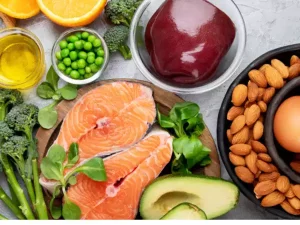For a long time, fats were seen as something to avoid, especially for anyone aiming to lose weight. But not all fats are created equal, and in recent years, healthy fats have gained recognition for their positive role in a balanced diet and weight loss. These “good” fats—primarily unsaturated fats—help the body function optimally, assist in nutrient absorption, and can even contribute to shedding excess weight. Here’s a closer look at how healthy fats can play a key role in your weight loss journey.
Understanding Healthy Fats
Healthy fats are primarily unsaturated fats, including monounsaturated and polyunsaturated fats. These fats are found in foods like avocados, nuts, seeds, olive oil, and fatty fish. Unlike saturated and trans fats, which can contribute to weight gain and health issues, unsaturated fats provide energy, support cell growth, and help manage inflammation in the body.
Monounsaturated fats, found in foods like olive oil, avocados, and nuts, are particularly known for their heart-protective benefits. Polyunsaturated fats, including omega-3 and omega-6 fatty acids, are found in fish, flaxseeds, and walnuts, and are crucial for brain function and reducing inflammation. Together, these healthy fats provide important benefits that can directly and indirectly support weight loss.
1. Healthy Fats Increase Satiety
One of the biggest benefits of incorporating healthy fats into your diet is the feeling of fullness they provide. Fats take longer to digest than carbohydrates and proteins, which means they stay in your stomach longer, promoting a lasting sense of satiety. When you feel full and satisfied after a meal, you’re less likely to reach for snacks or consume additional calories, making it easier to stick to a calorie-controlled diet.
Healthy fats also help stabilize blood sugar levels by slowing down the absorption of sugar into the bloodstream. By avoiding rapid spikes and crashes in blood sugar, you can reduce hunger cravings that often lead to overeating.
2. Fats and Metabolism Boost
Contrary to what many may think, consuming healthy fats can actually support a faster metabolism. The body requires energy to digest and process the foods we eat, and fats have a high thermic effect—meaning the body burns more calories digesting fats than it does with simple carbohydrates. This is particularly true for foods containing medium-chain triglycerides (MCTs), found in coconut oil, which are quickly metabolized and used as an energy source. MCTs have been shown to increase energy expenditure and fat-burning potential, giving your metabolism a natural boost.
3. Hormone Regulation and Fat Loss
Hormones play a significant role in weight management, and healthy fats are essential for hormone production and balance. Fats contribute to the production of hormones that regulate metabolism, hunger, and satiety. For example, the hormone leptin, which is responsible for signaling fullness, is dependent on adequate fat intake. When you consume healthy fats, leptin levels increase, which helps control appetite and reduce cravings.
On the other hand, low-fat diets can disrupt hormone production, leading to imbalances that make weight loss more challenging. Including healthy fats in your diet helps to maintain optimal hormone levels, which is essential for effective weight management.
4. Energy and Exercise Performance
Fats are a dense source of energy, providing nine calories per gram—more than double the energy found in carbohydrates or proteins. Healthy fats serve as a long-lasting fuel source for the body, making them particularly beneficial for endurance activities and workouts. When your body has access to steady, sustainable energy, you’re more likely to maintain an active lifestyle and push through workouts that burn calories.
Additionally, fats are especially helpful for those following low-carb or ketogenic diets. In these diets, the body relies on fats for energy instead of carbohydrates, putting it into a state called ketosis, where it burns fat for fuel. This metabolic shift can help accelerate fat loss when paired with a well-structured eating plan.
5. Absorption of Essential Nutrients
Some vitamins, such as A, D, E, and K, are fat-soluble, meaning they need fat to be absorbed properly by the body. By including healthy fats in your diet, you ensure your body can absorb these essential vitamins, which support everything from immune function to bone health. When your body is adequately nourished, you’re less likely to experience cravings or feel deprived, which helps you stick to a balanced eating plan. Nutrient absorption is critical for overall health, and when your body is functioning at its best, it becomes easier to manage weight.
6. Reducing Inflammation with Omega-3 Fatty Acids
Inflammation can hinder weight loss and even contribute to weight gain, as it’s often associated with increased fat storage and insulin resistance. Omega-3 fatty acids, found in fatty fish like salmon, flaxseeds, and chia seeds, are known for their anti-inflammatory properties. By reducing inflammation in the body, omega-3s can help improve insulin sensitivity and make it easier for the body to burn fat. When combined with a balanced diet, foods rich in omega-3s can play a valuable role in your weight loss journey by creating a healthier internal environment for your metabolism to function optimally.
7. Mental Wellbeing and Reduced Stress Eating
Healthy fats also play a role in mental health, particularly in supporting brain function and mood regulation. Studies show that omega-3 fatty acids may reduce symptoms of depression and anxiety, while monounsaturated fats can positively impact brain health. Emotional eating is a common barrier to weight loss, and managing stress through a balanced diet rich in healthy fats can help reduce stress-related food cravings.
By incorporating these fats into your diet, you may experience better mental clarity, mood stability, and resilience against stress, all of which contribute to a healthier approach to eating and weight management.
Conclusion
Healthy fats are essential for a successful, balanced approach to weight loss. They keep you full, support metabolism, aid in nutrient absorption, regulate hormones, and improve mental health—all factors that make it easier to lose weight and maintain it. While it’s important to control portion sizes to avoid excess calories, incorporating sources of healthy fats like avocados, nuts, seeds, olive oil, and fatty fish can provide numerous benefits for both weight loss and overall health. Embracing healthy fats as part of a well-rounded diet allows you to enjoy nutritious, satisfying meals while supporting a sustainable and effective weight loss journey.





